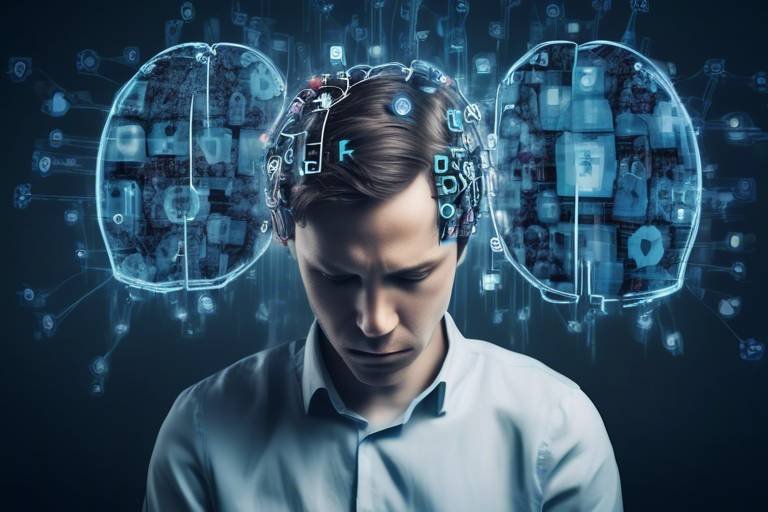Role of AI in Mental Health Tech
Artificial Intelligence (AI) is not just a buzzword anymore; it’s a game changer, especially in the realm of mental health care. Imagine a world where your mental health is monitored and managed with the precision of a well-tuned machine. AI is stepping into this role, transforming traditional practices into innovative solutions that enhance diagnostics, personalize treatment, and improve accessibility. The integration of AI into mental health tech is akin to having a personal assistant who not only understands your needs but also anticipates them, making your journey toward mental wellness smoother and more effective.
As we dive deeper into this fascinating intersection of technology and mental health, it’s crucial to recognize how AI is reshaping the landscape. From early detection of conditions like depression and anxiety to the development of tailored treatment plans, the potential of AI is enormous. With advanced algorithms and data analysis techniques, AI can sift through vast amounts of information, identifying patterns that even the most experienced professionals might overlook. This capability not only enhances the accuracy of diagnoses but also leads to more effective treatments.
Moreover, the accessibility of mental health care is significantly improved through AI. Imagine being able to receive support from the comfort of your home, with AI tools assisting therapists in understanding and engaging with their clients more effectively. This is not just a futuristic dream; it’s happening right now. However, with great power comes great responsibility, and as we embrace these advancements, we must also consider the ethical implications that accompany them. Questions surrounding data privacy, algorithmic bias, and the overall fairness of AI applications in mental health must be addressed to ensure that everyone benefits from these innovations.
In summary, the role of AI in mental health tech is multifaceted and transformative. It offers unprecedented opportunities for enhancing care and support for individuals struggling with mental health issues. The journey ahead is exciting, but it requires a careful balance of innovation and ethical considerations to truly realize the potential of AI in this vital field.
- How does AI improve mental health diagnostics? AI analyzes vast amounts of data to identify patterns and symptoms that may indicate mental health conditions, leading to faster and more accurate diagnoses.
- Can AI create personalized treatment plans? Yes! AI can analyze individual patient data to tailor treatment plans that suit specific needs and preferences, enhancing the effectiveness of interventions.
- What are the ethical concerns surrounding AI in mental health? Ethical considerations include data privacy, consent, and the potential for bias in algorithms, which can affect the quality of care provided.
- Will AI replace mental health professionals? AI is designed to assist and enhance the work of mental health professionals, not replace them. It provides tools that can lead to better patient outcomes.

AI-Driven Diagnostics
Artificial Intelligence is making waves in the field of mental health diagnostics, transforming how we identify and assess various mental health conditions. Traditionally, diagnosing issues like depression or anxiety relied heavily on self-reported symptoms and clinician observations, which could often be subjective and inconsistent. However, with the advent of AI technologies, we are now witnessing a more precise and efficient approach to understanding mental health disorders.
AI-driven diagnostics utilize advanced algorithms and data analysis techniques to sift through vast amounts of data, identifying patterns that may not be immediately apparent to human practitioners. For example, by analyzing speech patterns, social media activity, or even physiological data from wearable devices, AI can provide insights into a person’s mental state. This not only speeds up the diagnostic process but also enhances its accuracy, leading to better outcomes for patients.
One of the standout features of AI in diagnostics is its ability to integrate machine learning and natural language processing. These technologies allow AI systems to learn from previous cases and continuously improve their diagnostic capabilities. Imagine a system that can analyze thousands of patient records and learn from each interaction; it becomes a powerful tool for clinicians. Here’s how AI is reshaping the diagnostic landscape:
- Enhanced Speed: AI can process information much faster than a human, allowing for quicker assessments.
- Increased Accuracy: By reducing human error and bias, AI can lead to more accurate diagnoses.
- Comprehensive Data Analysis: AI can analyze diverse data types, from clinical notes to biometric data, providing a holistic view of a patient’s mental health.
Moreover, AI's predictive capabilities are invaluable. For instance, through predictive analytics, AI can analyze historical data to forecast potential mental health crises. This proactive approach allows healthcare providers to intervene before a situation escalates, ultimately saving lives. Imagine having a system that not only detects a problem but also predicts when it might occur—this is the future of mental health diagnostics.
Real-time monitoring is another breakthrough area. AI systems can continuously assess a patient’s mental health status, providing immediate feedback and allowing for adjustments in treatment plans as needed. This level of engagement ensures that patients receive the care they need when they need it most, making the therapeutic process much more dynamic and responsive.
In conclusion, the integration of AI in mental health diagnostics is not just a trend; it’s a revolutionary step forward. As we continue to harness the power of technology, we can expect to see even more advancements that will redefine how we approach mental health care. The potential for improved patient outcomes and more personalized care is immense, making AI an essential player in the future of mental health diagnostics.

Personalized Treatment Plans
In the ever-evolving landscape of mental health care, are becoming a game changer, thanks to the power of artificial intelligence (AI). Imagine walking into a therapist's office and instead of receiving a one-size-fits-all approach, you are greeted with a tailored strategy that directly addresses your unique challenges and needs. This is not just a distant dream; it’s a reality driven by AI technologies that analyze individual patient data to create effective interventions.
AI systems sift through vast amounts of data, including medical history, symptom patterns, and even personal preferences. By employing advanced algorithms, these systems can identify trends and correlations that a human might overlook. For instance, if a patient has a history of anxiety exacerbated by certain life events, the AI can flag these triggers and suggest coping mechanisms that have been effective for similar cases in the past. This level of personalization ensures that treatment is not only relevant but also more likely to yield positive outcomes.
Moreover, the integration of AI into treatment planning allows for the continuous refinement of these plans. As patients progress through their therapy, AI can analyze ongoing feedback and adjust the treatment accordingly. This real-time adaptability is crucial, as mental health conditions can be fluid, with symptoms fluctuating based on various factors such as stress, environment, and lifestyle choices.
To understand how AI achieves this remarkable feat, we must delve into the data analysis techniques it employs. Techniques such as machine learning and natural language processing enable AI to interpret complex patient information. For example, machine learning algorithms can analyze responses to questionnaires and identify which therapeutic approaches have historically worked best for individuals with similar profiles.
Natural language processing plays a vital role as well. By analyzing written or spoken language, AI can gauge a patient’s emotional state and identify subtle changes in mood or behavior that may indicate a need for a treatment adjustment. This comprehensive understanding of the patient’s experience allows for a richer, more nuanced approach to therapy.
Another fascinating aspect of AI in personalized treatment is the use of predictive analytics. By examining historical data, AI can anticipate potential crises and patient needs. For instance, if a patient has previously experienced a downturn in mental health during specific seasons or events, the AI can alert both the patient and their therapist to implement preventive strategies. This proactive approach can significantly reduce the risk of severe episodes and enhance overall treatment effectiveness.
Furthermore, AI systems can provide real-time monitoring of patients' mental health statuses. With the integration of wearable technology and mobile apps, patients can share their feelings and symptoms as they occur. This instant feedback loop allows for immediate adjustments to treatment plans, ensuring that interventions are as effective as possible. Imagine having a digital assistant that not only reminds you of your therapy appointments but also checks in on your mood and suggests coping strategies throughout the day!
In summary, the role of AI in crafting personalized treatment plans cannot be overstated. By leveraging advanced data analysis techniques, predictive analytics, and real-time monitoring, AI is paving the way for a future where mental health care is not only more effective but also more accessible. The potential for improved patient outcomes is immense, making this an exciting time for both practitioners and those seeking help.
- What is a personalized treatment plan? A personalized treatment plan is a tailored approach to mental health care that considers an individual's unique history, symptoms, and preferences to create a more effective intervention strategy.
- How does AI contribute to personalized treatment? AI analyzes vast amounts of patient data to identify patterns and trends, allowing for the creation of treatment plans that are specifically designed for each individual's needs.
- Can AI predict mental health crises? Yes, through predictive analytics, AI can help anticipate potential crises by analyzing historical data and identifying triggers.
- Is patient data secure with AI systems? While AI systems strive to adhere to strict privacy regulations, it’s essential for providers to ensure that patient data is handled securely and confidentially.

Data Analysis Techniques
When it comes to revolutionizing mental health care, play a pivotal role. The integration of artificial intelligence (AI) into mental health diagnostics and treatment is largely driven by sophisticated methods such as machine learning and natural language processing. These techniques enable AI systems to sift through vast amounts of patient data, identifying patterns and insights that would be nearly impossible for humans to discern on their own. Imagine having a personal assistant that not only remembers everything about you but can also analyze your behaviors and emotions to predict your mental health needs. That’s the power of AI!
Machine learning, a subset of AI, uses algorithms that improve automatically through experience. This means that the more data it processes, the more accurate it becomes in its predictions and diagnoses. For instance, by analyzing historical data from patients, machine learning can identify early signs of conditions like depression or anxiety, allowing for interventions before a crisis occurs. This proactive approach is akin to having a weather forecast for your mental health—anticipating storms before they hit.
On the other hand, natural language processing (NLP) enables AI to understand and interpret human language. In mental health care, this can be incredibly valuable. For example, AI can analyze patient conversations during therapy sessions, extracting key emotional indicators and themes that might otherwise go unnoticed. This helps therapists tailor their approaches based on real-time insights, making therapy more effective. Think of it as having a second set of eyes and ears that can catch nuances in dialogue that even the most attentive human might miss.
Furthermore, the combination of these techniques leads to the development of predictive analytics. This powerful tool allows mental health professionals to foresee potential crises by analyzing trends and patterns in patient data. For instance, if a patient’s mood tracking shows a downward trend over several weeks, AI can alert the therapist to intervene sooner rather than later. This is not just about reacting to problems; it’s about being proactive and providing support when it’s needed the most. The ability to monitor and analyze data in real-time is a game changer, ensuring that mental health care is not only responsive but also anticipatory.
In summary, the application of data analysis techniques in mental health care is transforming how we understand and treat mental health conditions. By leveraging machine learning and natural language processing, AI can provide insights that lead to better diagnostics and personalized treatment plans. As we continue to explore the capabilities of these technologies, we stand on the brink of a new era in mental health support—one that is more informed, responsive, and tailored to individual needs.
- What is machine learning in mental health?
Machine learning is a technique where algorithms improve their performance as they process more data, helping to identify patterns and make predictions about mental health conditions.
- How does natural language processing help therapists?
Natural language processing allows AI to analyze conversations in therapy sessions, extracting emotional cues and themes that help therapists understand their patients better.
- What is predictive analytics?
Predictive analytics uses historical data to forecast future events, such as potential mental health crises, enabling timely interventions.
- Can AI replace human therapists?
While AI can enhance diagnostics and support, it is not a replacement for human therapists. The human touch is essential in therapy, and AI serves as a tool to assist professionals.

Predictive Analytics
Predictive analytics is like having a crystal ball for mental health care, enabling professionals to foresee potential challenges and respond proactively. By leveraging advanced algorithms and historical data, AI can identify patterns that may indicate a patient's likelihood of experiencing a crisis or worsening symptoms. Imagine being able to predict a storm before it hits; that's the power predictive analytics brings to mental health. It’s not just about reacting to issues as they arise but anticipating them and taking steps to mitigate risks.
For instance, consider a patient with a history of depression. By analyzing their past treatment responses, social media activity, and even biometric data from wearable devices, AI can flag signs of potential relapse. This allows healthcare providers to intervene early, perhaps by adjusting medication or increasing therapy sessions, long before the patient reaches a crisis point. The result? Improved outcomes and a more supportive care environment.
The integration of predictive analytics into mental health care not only enhances patient safety but also optimizes resource allocation within healthcare systems. Hospitals and clinics can better manage their resources by anticipating patient needs, reducing wait times, and ensuring that the right support is available when it's most needed. This proactive approach is a game-changer, especially in a field where timely intervention can make all the difference.
Moreover, predictive analytics can also be beneficial in identifying trends across larger populations. By analyzing data from various sources, AI can uncover insights that help mental health professionals understand broader issues, such as the impact of societal changes on mental well-being. This can lead to more effective public health strategies and interventions tailored to specific communities.
However, while the potential benefits of predictive analytics are immense, it’s vital to approach this technology with caution. The accuracy of predictions heavily relies on the quality of the data used. Poorly constructed datasets can lead to erroneous forecasts, which might adversely affect treatment plans. Therefore, continuous monitoring and refinement of these predictive models are essential to ensure they remain reliable and effective.
In conclusion, predictive analytics stands at the forefront of transforming mental health care, offering a proactive approach that can lead to better patient outcomes. By anticipating needs and potential crises, AI not only enhances the quality of care but also empowers mental health professionals to provide more personalized and effective interventions. As we continue to explore the capabilities of AI in this field, the future looks promising, with the potential for even greater advancements in mental health care delivery.
- What is predictive analytics in mental health?
Predictive analytics in mental health refers to the use of data analysis techniques to forecast potential issues and outcomes in patients' mental health, allowing for proactive interventions. - How does AI improve mental health diagnostics?
AI enhances mental health diagnostics by analyzing vast amounts of data quickly and accurately, identifying patterns that may not be immediately apparent to human clinicians. - Are there ethical concerns with using AI in mental health?
Yes, there are ethical concerns regarding data privacy, consent, and potential biases in AI algorithms that could affect treatment outcomes for marginalized populations. - Can predictive analytics help in crisis prevention?
Absolutely! By identifying early warning signs and trends, predictive analytics can help mental health professionals intervene before a crisis occurs.

Real-Time Monitoring
In the fast-paced world we live in today, mental health care is evolving at an unprecedented rate, and one of the most exciting advancements is through artificial intelligence (AI). Imagine having a personal assistant dedicated solely to your mental well-being, constantly analyzing your mood and stress levels, and providing immediate feedback. This isn't science fiction; it's the reality of AI-powered mental health tools that are reshaping how we approach emotional support.
Real-time monitoring utilizes a combination of wearable devices, mobile applications, and sophisticated algorithms to track a patient's mental health status continuously. These tools can measure various indicators, such as heart rate variability, sleep patterns, and even voice tone during conversations. By gathering this data, AI can provide insights that help both patients and healthcare providers make informed decisions about treatment adjustments. For instance, if a patient is experiencing heightened anxiety levels, the system can alert them to practice mindfulness techniques or suggest a check-in with their therapist.
Moreover, the integration of real-time monitoring into treatment plans allows for a more dynamic approach to mental health care. Instead of waiting for scheduled appointments to assess progress, therapists can receive instant updates on their patients' conditions. This capability not only fosters better communication between patients and providers but also enables timely interventions when necessary. Imagine a scenario where a patient feels a sudden spike in anxiety; with real-time monitoring, their therapist can respond quickly, perhaps through a brief video call or a supportive message.
However, the benefits of real-time monitoring extend beyond just immediate feedback. It also contributes to a more comprehensive understanding of a patient's mental health journey over time. By analyzing patterns in the data collected, AI can identify triggers and suggest preventive measures, effectively acting as a safety net for individuals at risk of mental health crises. This proactive approach can be likened to having a weather app that not only tells you the current temperature but also predicts when a storm might hit, allowing you to prepare in advance.
As we delve deeper into the realm of mental health technology, it is essential to recognize that while real-time monitoring offers incredible advantages, it must be implemented thoughtfully. Patients should be educated about how their data will be used and have the option to opt in or out of certain features. Striking a balance between innovation and ethical considerations is crucial to ensuring that these tools serve their intended purpose without compromising patient trust.
- What is real-time monitoring in mental health?
Real-time monitoring involves using technology to track a patient's mental health status continuously, providing immediate insights and feedback to both patients and healthcare providers. - How does AI contribute to real-time monitoring?
AI analyzes data from various sources, such as wearable devices and mobile apps, to detect changes in a patient's mental health and suggest timely interventions. - Are there privacy concerns with real-time monitoring?
Yes, protecting patient data is crucial, and AI applications must comply with strict privacy regulations to ensure that sensitive information remains secure. - Can real-time monitoring replace traditional therapy?
While real-time monitoring enhances therapy by providing additional insights, it should complement traditional therapy rather than replace it.

Integration with Teletherapy
This article explores how artificial intelligence is transforming mental health care, enhancing diagnostics, treatment personalization, and accessibility, while also addressing ethical considerations and future implications.
AI technologies are revolutionizing the diagnostic process in mental health, enabling faster and more accurate assessments of conditions such as depression and anxiety through advanced algorithms and data analysis.
Artificial intelligence facilitates the creation of personalized treatment plans by analyzing individual patient data, leading to more effective interventions tailored to specific needs and preferences.
Various data analysis techniques, including machine learning and natural language processing, enable AI to interpret complex patient information, improving the quality of mental health care delivered.
Predictive analytics in AI helps anticipate patient needs and potential crises by analyzing historical data, thereby allowing for timely interventions and support.
AI systems can monitor patients in real-time, providing immediate feedback and adjustments to treatment plans based on ongoing assessments of their mental health status.
The integration of AI with teletherapy platforms is a game-changer in the realm of mental health care, making it more accessible and effective for patients. Imagine being able to access your therapist from the comfort of your home while having an intelligent system that assists both you and your therapist in real-time. This is not just a futuristic dream; it's happening now!
With AI tools embedded in teletherapy applications, therapists can leverage intelligent analytics to enhance patient engagement during virtual sessions. For instance, AI can analyze speech patterns, emotional cues, and even facial expressions to provide therapists with insights that might not be immediately obvious. This allows for a more tailored approach to therapy, where the therapist can adjust their techniques based on real-time feedback.
Moreover, AI can assist in scheduling and reminders, reducing the administrative burden on therapists. This means more time can be spent on actual therapy rather than paperwork. Patients can also benefit from AI-driven chatbots that offer support between sessions, providing coping strategies or simply a listening ear when needed. These chatbots can:
- Provide instant responses to common mental health queries.
- Offer resources and exercises tailored to the patient's current mood.
- Facilitate journaling or mood tracking to share with therapists during sessions.
In essence, the integration of AI with teletherapy not only enhances the therapeutic experience but also democratizes access to mental health care. It breaks down geographical barriers, allowing individuals from remote areas to receive quality mental health support. As we continue to embrace this technology, the future of mental health care looks promising, opening doors to innovative solutions that cater to diverse populations.
The implementation of AI in mental health raises ethical questions regarding privacy, consent, and the potential for bias in algorithms, necessitating careful consideration and regulation.
Protecting patient data is paramount, and AI applications must adhere to strict privacy regulations to ensure that sensitive information is kept secure and confidential.
Addressing bias in AI algorithms is crucial to ensure equitable mental health care, as biased data can lead to misdiagnoses and ineffective treatment for marginalized populations.
Looking ahead, AI is poised to play an even more significant role in mental health care, with advancements in technology promising to enhance treatment outcomes and patient experiences.
- How does AI improve mental health diagnostics?
AI improves diagnostics by analyzing vast amounts of data, identifying patterns, and providing faster, more accurate assessments of mental health conditions. - Can AI replace therapists?
No, AI is designed to assist therapists, not replace them. It enhances the therapeutic process by providing insights and support. - What are the ethical concerns regarding AI in mental health?
Key concerns include data privacy, the potential for bias in algorithms, and ensuring informed consent from patients. - How does teletherapy benefit from AI?
AI enhances teletherapy by providing real-time analytics, improving patient engagement, and offering support between sessions through chatbots.

Ethical Considerations
The integration of artificial intelligence in mental health care brings forth a myriad of ethical considerations that must be addressed to ensure responsible use of technology. As we embrace the potential of AI to transform diagnostics and treatment, we must also remain vigilant about the implications that come with it. One of the most pressing issues is data privacy. Mental health data is often sensitive, and the use of AI requires the collection and analysis of personal information, which raises significant concerns about how this data is stored, used, and potentially misused. Patients must be assured that their information is kept confidential and secure, adhering to strict regulations such as HIPAA in the United States.
Moreover, there is the question of informed consent. Patients need to fully understand what they are consenting to when their data is used by AI systems. This includes clarity on how their information will be analyzed and the potential outcomes of such analysis. It’s crucial for mental health professionals to communicate effectively about these processes, ensuring that patients feel comfortable and informed about their participation in AI-driven treatments.
Another significant ethical concern is the potential for bias in algorithms. AI systems learn from data, and if that data is biased, the outcomes can be skewed, leading to misdiagnoses or ineffective treatments, particularly for marginalized populations. For instance, if an AI system is trained primarily on data from a specific demographic, it may not accurately interpret or respond to the needs of individuals from different backgrounds. This can perpetuate existing disparities in mental health care and lead to a lack of trust in these technologies.
To illustrate the impact of bias in AI, consider the following table that highlights potential consequences:
| Bias Type | Potential Consequences |
|---|---|
| Data Bias | Misdiagnosis, ineffective treatment plans |
| Algorithmic Bias | Unequal access to care, reinforcement of stereotypes |
| Outcome Bias | Disparities in treatment effectiveness across populations |
As we navigate these ethical waters, it’s essential to foster a culture of transparency and accountability within the field of mental health tech. Developers and practitioners must work hand in hand to create guidelines that prioritize ethical standards, ensuring that AI applications are both effective and equitable. This includes ongoing training for mental health professionals on the implications of AI, as well as regular audits of AI systems to identify and mitigate bias.
In conclusion, while AI holds immense promise for enhancing mental health care, it is imperative that we approach its implementation with a thoughtful and ethical mindset. By addressing concerns related to privacy, consent, and bias, we can harness the power of AI to improve mental health outcomes without compromising the trust and safety of those we aim to help.
- What are the main ethical concerns of AI in mental health? The main concerns include data privacy, informed consent, and algorithmic bias.
- How can bias in AI algorithms affect mental health treatment? Bias can lead to misdiagnoses and unequal treatment outcomes, particularly for marginalized groups.
- What steps are being taken to ensure ethical AI use in mental health? Efforts include creating guidelines for transparency, regular audits of AI systems, and ongoing training for professionals.

Data Privacy Concerns
In the era of digital health, the integration of artificial intelligence in mental health care has sparked a myriad of discussions, particularly surrounding data privacy. As we entrust AI systems with sensitive information about our mental well-being, questions about how this data is stored, used, and protected become paramount. The very nature of mental health data is deeply personal, often encompassing not just clinical symptoms but also emotional and psychological experiences. Hence, the potential for misuse or unauthorized access to this information raises significant alarms.
To illustrate the gravity of these concerns, consider the following:
- Confidentiality Risks: With AI systems processing vast amounts of patient data, the risk of breaches increases. Hackers are constantly evolving, and a single vulnerability can expose sensitive information to the wrong hands.
- Informed Consent: Patients must be made aware of how their data will be used. Are they fully informed about the extent of data sharing with third parties? This lack of transparency can lead to mistrust in AI systems.
- Data Ownership: Who owns the data once it is collected? Patients may feel a sense of ownership over their personal information, yet many AI applications operate under terms that can obscure this ownership.
Moreover, the legal landscape surrounding data privacy is constantly evolving. Regulations such as the General Data Protection Regulation (GDPR) in Europe and the Health Insurance Portability and Accountability Act (HIPAA) in the United States set stringent guidelines on how personal data should be handled. Compliance with these regulations is not just a legal obligation but a moral one, ensuring that patients feel safe and secure in sharing their mental health data.
As we navigate this complex terrain, mental health practitioners and AI developers must collaborate to establish robust frameworks that prioritize patient privacy. This involves implementing advanced encryption techniques, conducting regular audits, and fostering a culture of transparency. By doing so, we can mitigate the risks associated with data privacy while harnessing the full potential of AI in mental health care.
Ultimately, addressing data privacy concerns is not just about protecting information; it's about building trust. Trust is the foundation of any therapeutic relationship, and as we incorporate AI into mental health, we must ensure that patients feel confident that their personal stories are safeguarded.
- What measures are in place to protect my data when using AI in mental health?
Organizations typically implement encryption, anonymization, and strict access controls to safeguard patient data.
- How can I ensure my consent is informed when sharing my data?
Always read the privacy policy and ask questions if anything is unclear. You have the right to know how your data will be used.
- What should I do if I suspect my data has been compromised?
Contact the service provider immediately and consider reporting the incident to relevant authorities.

Bias and Fairness
The integration of artificial intelligence in mental health care brings forth an array of promising advancements, but it also raises significant concerns regarding . As AI systems are trained on historical data, they may inadvertently inherit biases present in that data. This can lead to skewed outcomes, where certain demographics receive subpar diagnoses or treatment recommendations. Imagine a scenario where a tool designed to assess mental health conditions predominantly reflects the experiences of a specific group, leaving others underrepresented. The implications can be dire, as marginalized populations may not receive the care they need, perpetuating existing disparities in mental health treatment.
To illustrate the potential impact of bias in AI algorithms, consider the following table summarizing various factors that contribute to biased outcomes:
| Factor | Description | Impact on Mental Health Care |
|---|---|---|
| Data Representation | Data sets that lack diversity | Leads to misdiagnoses for underrepresented groups |
| Algorithm Design | Choice of features and weights | May favor certain demographics over others |
| Feedback Loops | Reinforcement of biased outcomes | Exacerbates existing disparities in treatment |
Addressing these biases is not just a technical challenge; it is a moral imperative. Developers and stakeholders must collaborate to ensure that AI systems are built with equity and fairness in mind. This includes diversifying training data, implementing rigorous testing for bias, and continuously monitoring AI performance across different demographics. Transparency in how algorithms operate can also play a crucial role in fostering trust among patients and practitioners alike. By prioritizing fairness, we can work towards a future where AI enhances mental health care for everyone, regardless of their background.
Moreover, ethical considerations must extend beyond just the algorithms themselves. It’s essential to engage with communities that are often left out of the conversation. By incorporating feedback from diverse groups, we can ensure that mental health technologies are more inclusive and effective. This participatory approach not only helps in identifying potential biases early on but also empowers individuals to have a voice in how their mental health care is shaped.
In conclusion, while AI holds immense potential to revolutionize mental health care, we must remain vigilant about the biases that can arise. By fostering a culture of fairness and inclusivity, we can harness the power of AI to provide equitable mental health support, paving the way for a brighter, more inclusive future.
- What is bias in AI? Bias in AI refers to systematic errors that result in unfair treatment of certain individuals or groups based on their characteristics.
- How can bias affect mental health care? Bias can lead to misdiagnoses, ineffective treatments, and exacerbate existing disparities in health outcomes for marginalized populations.
- What steps can be taken to mitigate bias in AI? Steps include diversifying training data, testing algorithms for bias, and ensuring transparency in AI operations.
- Why is fairness important in mental health AI? Fairness ensures that all individuals receive appropriate care, ultimately leading to better mental health outcomes for everyone.

The Future of AI in Mental Health
This article explores how artificial intelligence is transforming mental health care, enhancing diagnostics, treatment personalization, and accessibility, while also addressing ethical considerations and future implications.
AI technologies are revolutionizing the diagnostic process in mental health, enabling faster and more accurate assessments of conditions such as depression and anxiety through advanced algorithms and data analysis.
Artificial intelligence facilitates the creation of personalized treatment plans by analyzing individual patient data, leading to more effective interventions tailored to specific needs and preferences.
Various data analysis techniques, including machine learning and natural language processing, enable AI to interpret complex patient information, improving the quality of mental health care delivered.
Predictive analytics in AI helps anticipate patient needs and potential crises by analyzing historical data, thereby allowing for timely interventions and support.
AI systems can monitor patients in real-time, providing immediate feedback and adjustments to treatment plans based on ongoing assessments of their mental health status.
AI's integration with teletherapy platforms enhances accessibility, allowing therapists to utilize intelligent tools for better engagement and support during virtual sessions.
The implementation of AI in mental health raises ethical questions regarding privacy, consent, and the potential for bias in algorithms, necessitating careful consideration and regulation.
Protecting patient data is paramount, and AI applications must adhere to strict privacy regulations to ensure that sensitive information is kept secure and confidential.
Addressing bias in AI algorithms is crucial to ensure equitable mental health care, as biased data can lead to misdiagnoses and ineffective treatment for marginalized populations.
Looking ahead, AI is poised to play an even more significant role in mental health care, with advancements in technology promising to enhance treatment outcomes and patient experiences. Imagine a world where mental health professionals can leverage AI to not only diagnose but also predict the onset of mental health issues before they escalate. This proactive approach can lead to a paradigm shift in how we view mental health care, making it more preventative rather than reactive.
Furthermore, as AI continues to evolve, we can expect to see:
- Enhanced Emotional Intelligence: Future AI systems may be able to interpret human emotions with greater accuracy, allowing for more empathetic interactions between patients and machines.
- Virtual Reality Integration: Combining AI with virtual reality could create immersive therapy experiences, providing patients with safe environments to confront their fears and anxieties.
- Greater Accessibility: AI could facilitate access to mental health resources in underserved areas, breaking down barriers to care and ensuring that everyone has the support they need.
As we embrace these innovations, it's crucial to maintain a balance between technology and the human touch. The future of AI in mental health isn't just about machines replacing therapists; rather, it's about enhancing the therapeutic process, making it more effective and accessible for all.
Q1: How is AI currently being used in mental health care?
AI is used for diagnostics, creating personalized treatment plans, and real-time monitoring of patients, among other applications.
Q2: What are the ethical concerns surrounding AI in mental health?
Concerns include data privacy, consent, and the potential for bias in AI algorithms that can affect treatment outcomes.
Q3: Will AI replace mental health professionals?
AI is designed to assist mental health professionals, not replace them. The goal is to enhance care and improve patient outcomes.
Q4: How can AI improve access to mental health care?
AI can help bridge gaps in care, especially in underserved areas, by providing resources and support through teletherapy and other platforms.
Frequently Asked Questions
- How is AI used in mental health diagnostics?
AI is used in mental health diagnostics by employing advanced algorithms that analyze patient data to provide faster and more accurate assessments of conditions like depression and anxiety. This technology can identify patterns in data that might be missed by human practitioners, leading to improved diagnostic accuracy.
- What are personalized treatment plans in AI?
Personalized treatment plans created by AI analyze individual patient data, including their history, preferences, and responses to previous treatments. This leads to more effective interventions tailored specifically to each patient's unique needs, enhancing the likelihood of successful outcomes.
- Can AI predict mental health crises?
Yes, AI can utilize predictive analytics to anticipate potential mental health crises by analyzing historical data and identifying warning signs. This allows healthcare providers to intervene proactively, providing support before a crisis escalates.
- How does AI enhance teletherapy?
AI enhances teletherapy by integrating intelligent tools that help therapists engage more effectively with their clients during virtual sessions. These tools can provide insights into patient behavior and emotional states, allowing for more responsive and tailored therapeutic approaches.
- What ethical concerns are associated with AI in mental health?
Ethical concerns regarding AI in mental health include data privacy, informed consent, and the potential for bias in algorithms. It's crucial that AI applications adhere to strict regulations to protect sensitive patient information and ensure fair treatment across diverse populations.
- How does AI handle data privacy?
AI applications in mental health are required to comply with stringent privacy regulations to safeguard patient data. This includes implementing robust security measures to protect sensitive information from unauthorized access and ensuring that data is used ethically and responsibly.
- What is the future of AI in mental health care?
The future of AI in mental health care looks promising, with ongoing advancements in technology expected to improve treatment outcomes and enhance patient experiences. As AI continues to evolve, it will likely play an even more significant role in delivering effective mental health support.



















